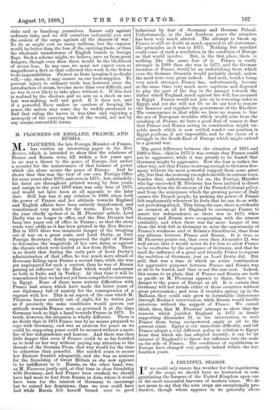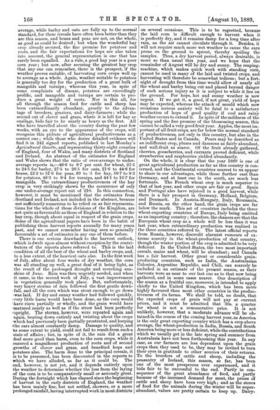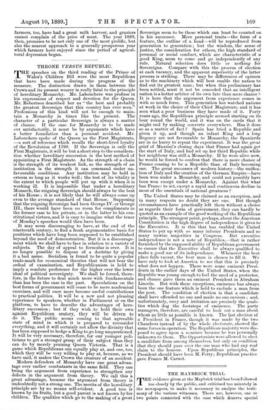A FRUITFUL SEASON.
IF we could only ensure fine weather for the ingathering of the crops, we should have no hesitation in con- gratulating the farmers of the United Kingdom upon one of the most successful harvests of modern times. We do not mean to say that the corn crops are exceptionally pro- ductive, though wheat appears to be generally above average, while barley and oats are fully up to the normal standard, for these cereals have often been better than they are this season, and beans and peas are not, on the whole, as good as could be desired ; but when the wonderful hay crop already secured, the fine promise for potatoes and roots, and the fair expectations for hops are also taken into account, the general representation is one that has rarely been equalled. As a rule, a good hay year is a poor corn year ; but now, after securing the greatest hay crop that any one can remember, there is the prospect, if the weather proves suitable, of harvesting corn crops well up to average as a whole. Again, weather suitable to potatoes is generally too dry for the production of a great bulk of mangolds and turnips ; whereas this year, in spite of some complaints of disease, potatoes are exceedingly prolific, and mangolds and turnips are certain to pro- duce a great weight of roots. Nor is this all, for all through the season feed for cattle and sheep has been extraordinarily abundant, greatly to the advan- tage of breeders, graziers, and dairy-farmers ; while the second cut of clover and grass, where it is left for hay or ensilage, bids fair to be nearly as heavy as the first. All who have travelled about the country during the past few weeks, with an eye to the appearance of the crops, will recognise this picture of agricultural productiveness as a correct one ; while those who desire detailed evidence will find it in 242 signed reports, published in last Monday's Agricultural Gazette, and representing thirty-eight counties of England, four of Wales, and many districts of Scotland and Ireland. An abstract of the estimates for England and Wales shows that the ratio of over-average to under- average reports is,-48-6 to 81 per cent. for wheat, 25.5 to 24.5 for barley, 27.5 to 26.5 for oats, 2111 to 4411 for beans, 22.2 to 31.6 for peas, 89 to .5 for hay, 561 to 8.3 for potatoes, 48.3 to 8.4 for turnips, and 44.1 to 16.7 for mangolds. The extraordinary productiveness of the hay crop is very strikingly shown by the occurrence of only one under-average report out of 210. In this connection, however, it must be mentioned that the estimates from .Scotland and Ireland, not included in the abstract, because 'not sufficiently numerous to be relied on as fair representa- tions for the whole of those divisions of the Kingdom, are snot quite as favourable as those of England in relation to the hay crop, though about equal in respect of the grain crops. ...Some of the agricultural papers have been in the habit of publishing these harvest reports annually for many years past, and we cannot remember having seen so generally favourable a set of estimates in any one of them before. There is one serious drawback to the harvest outlook, -which is dwelt upon almost without exception by the contri- butors of the reports above referred to. This is the laid • condition of all the best of the wheat and barley crops, and, to a less extent, of the heaviest oats also. In the first week of July, after about four weeks of dry weather, the corn was all standing up well, a great deal of it being light, as the result of the prolonged drought and scorching sun- shine of June. Rain was then urgently needed, and when it came, in the second week of July, a vast improvement in vegetation generally took place. But, unfortunately, very heavy storms of rain followed the first gentle down- -fall, and all the corn which was stout enough to go down .was laid. If dry and sunny weather had followed quickly, wery little harm would have been done, as the corn would 'have risen partially or wholly, and the grain would have 'matured nearly as well as if the straw had been perfectly 'upright. The storms, however, were repeated again and again, beating down entirely and twisting about the crops 'which had previously been partially prostrated, and keeping /the ears almost constantly damp. Damage to quality, and to some extent to yield, could not fail to result from such a state of affairs ; but, in spite of it, the rain did a great deal more good than harm, even to the corn crops, while it ensured a magnificent production of roots and of second growths of clover and grass, and benefited hops and potatoes also. The harm done to the principal cereals, it is to be presumed, has been discounted in the reports to which we have alluded, as far as it could be. The end, however, is not yet, and it depends entirely upon the weather to determine whether the loss from the laying of the corn is to be comparatively small or seriously great. During the fortnight which has elapsed since the beginning of harvest in the early districts of England, the weather has been mainly fine, but not settled, showers, or a more prolonged rainfall, having interrupted work in most districts on several occasions. This is to be regretted, because the laid corn is difficult enough to harvest when it is perfectly dry, and it remains damp for a long time after rain, as the air cannot circulate through it. Besides, it will not require much more wet weather to cause the ears • prone on the ground to sprout, thereby spoiling the samples. Thus, a dry harvest period, always desirable, is more so than usual this year, and we hope that the remainder of August will be dry and sunny. The reaping. machine, which makes quick work with standing corn, cannot be used in many of the laid and twisted crops, and harvesting will therefore be somewhat tedious ; but a fort- night of drought from this time would allow of nearly all the wheat and barley being cut and placed beyond danger of such serious injury as it is subject to while it lies on the ground. For hops, hot and sunny weather is now urgent. If we get it, a good, if not great, yield of hops may be expected, whereas the attack of mould which now occasions serious anxiety will be fatal to a satisfactory production of hops of good quality if cool and rainy weather occurs to extend it. In spite of the mildness of the spring and the fine promise of the blossoming season, this cannot be called a very good fruit year. Apples, the most im- portant of all fruit crops, are far below the normal standard of productiveness, not only in this country, but also in the United States and in Canada. Pears may be described as an indifferent crop, plums and damsons as fairly abundant, and wall-fruit as scarce. Of the fruit already gathered, cherries, gooseberries, and currants proved deficient, while strawberries and raspberries yielded abundantly. On the whole, it is clear that the year 1889 is one of great agricultural production as far as this country is con- cerned, and the Continental countries nearest to us appear to share in our advantages, while those further east than Germany, and at least one in the south, are much less fortunate. The French wheat crop is much superior to that of last year, and other crops are fair or good. Spain and Portugal also have rejoiced in a good harvest, while there is a fair prospect in Germany, Holland, Belgium, and Denmark. In Austria-Hungary, Italy, Roumania, and Russia, on the other hand, the grain crops are far below the mark. This set of countries includes the three wheat-exporting countries of Europe, Italy being omitted as an importing country ; therefore, the chances are that the European wheat crop as a whole will be less than it was last year, when extraordinary production was realised in the three countries referred to. The latest official reports from Russia, however, discredit alarmist rumours of ex- treme scarcity in the wheat-production of that country, though the winter portion of the crop is admitted to be very deficient. In the United States, the two most important cereals, maize and wheat, will be abundant ; and Canada has a fair harvest. Other great or considerable grain- producing countries, such as India, the Australasian Colonies, Argentine Republic, and Chili, can scarcely be included in an estimate of the present season, as their harvests were as near to our last one as to that now being gathered, and in some cases nearer. Our description of the season as a fruitful one, moreover, is intended to apply chiefly to the United Kingdom, which has been more highly favoured than most other countries in the produc- tiveness of its farms. We shall be told, no doubt, that the expected crops of grain will not pay at current prices, and it must be admitted that 30s. a quarter for wheat is not a remunerative price. It is not unlikely, however, that a moderate advance will be ob- tained in the course of the coming harvest year, as America is the only great exporting country which has a crop above average, the wheat-production in India, Russia, and South America being more or less deficient, while the contributions which we usually get in the late spring and summer from Australasia have not been forthcoming this year. In any case, as our farmers are less dependent upon the grain crops than they used to be, they may be invited to turn their eyes in gratitude to other sources of their returns. To the breeders of cattle and sheep, including the peasantry of Ireland, this season, so far, has been one of the most prosperous ever experienced, and it bids fair to be successful to the end. Partly in con- sequence of the great abundance of feed, and partly because of the increased demand for meat, the prices of cattle and, sheep have been very high ; and as the stores of food for the animals during the winter will be super- abundant, values are pretty certain to keep up. Dairy. farmers, too, have had a great milk harvest, and graziers cannot complain of the price of meat. The year 1889, to be not o then, promises only one of the most prolific, but st approach t also the nearest a generally prosperous year which farmers have enjoyed since the period of agricul- tural depression began.




































 Previous page
Previous page